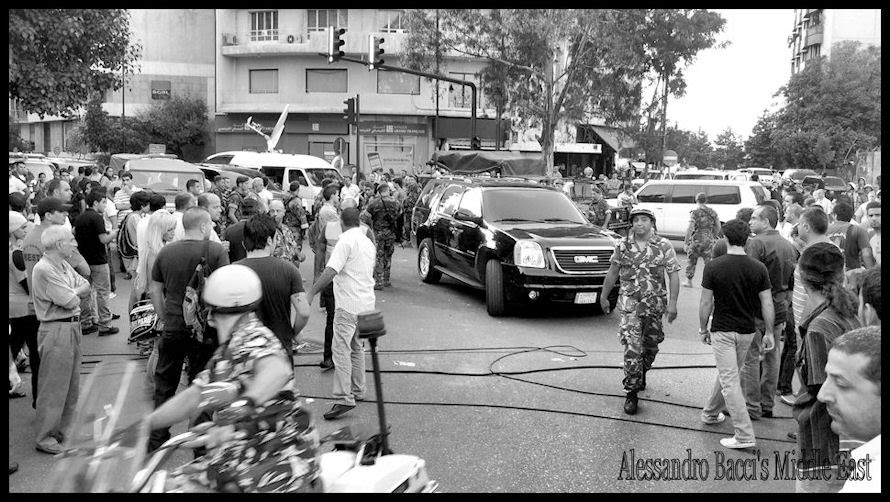
BEIRUT, Lebanon — Tension has been rising sharply in Lebanon
after Friday afternoon's car bombing (October 19), which exploded close to
Sassine Square in Beirut's Ashrafieh, a Christian central neighborhood. The bomb detonated
in a narrow street that is in the proximity of the headquarters of Saad
Hariri's 14 March Alliance. The explosion was well heard around the city — from
adjacent areas like Gemmayze and Mar Mikhael to the far hilly neighborhood of Baabda. The
blast took the life of eight people, wounded scores and completely ripped off
at least two buildings.
The target of the bomb was the head of the Lebanese intelligence branch of the Internal Security Forces (I.S.F.), Brig. Gen. Wissam al-Hassan, a Sunni Muslim who was profoundly anti-Syrian and who was very close politically to Saad Hariri. Mr. al-Hassan was probably going to be the I.S.F. next head. A couple of months ago he had been behind the investigation that was later the basis for prosecuting the former Lebanese information minister, Michael Samaha and two Syrians for complotting in order to foment religious hatred in Lebanon.
Immediately after the blast, many anti-Syrian a politician, like Saad Hariri and Druze leader Walid Jumblatt, started accusing President Bashar al-Assad of Syria to be behind the explosion. And Mr. Hariri's coalition also requested the government, which is run by Prime Minister Najib Mikati, to resign because of its inability to maintain internal security in the country. In fact, Lebanese politicians (especially those belonging to the opposition) are scared by the possible direct involvement of Lebanon into the current Syrian turmoil. It's worth remembering that the Syrian Army withdrew from Lebanon only in 2005, after a 29-year occupation. On Saturday, Mr. Mikati offered to resign so as to create a government of national unity, but President Michel Suleiman requested him to stay in power and to find a way out from this political crisis.
Late Friday, some protests started in
Beirut and Tripoli, especially in Sunni-inhabited areas. Currently, people are burning tires and
are blocking several roads. On Sunday morning, a fifteen-year-old boy was killed by a
random gunfire while confrontations between supporters and opponents of Syria's
president occurred in Tripoli. While thousands of Lebanese attended peacefully
(but, unequivocally chanting against the government and Syria) the funeral of
Mr. al-Hassam in Beirut's Martyrs' Square in the early afternoon of Sunday,
then later some people started storming with stones and metallic rods the
government offices located nearby. The police retaliated with warning shots and
tearing gas.
With reference to the current turmoil in Syria, the Muslim community in Lebanon is almost
perfectly split between Shias, who support President Bashar al-Assad of Syria, and
Sunnis, who support Syrian rebels (Druze people are much less numerous). Before Friday afternoon's car bombing, tension
had already risen in Lebanon for almost a week, following last Sunday's (October 13) Martyrs' Square's sit-in. On that occasion, the powerful Salafist
Sheikh al-Assir from Saida (Sidon) — he gained a lot of popularity some
months ago after that he and his followers had blocked the road between Sidon and Beirut — held a Sunni sit-in in Martyrs' Square, which is the same square where today
was celebrated the funeral. While on stage, he hurled all his anger
toward Syria's president and Hezbollah. The
Sunni rally ended peacefully, but later Sheikh al-Assir's convoy was pelted with
stones in central Beirut on its way back to Saida.
The situation looks quite unstable right now and
there is now fear that the country may fall back to a cycle of sectarian
violence and reprisals, which it has undergone in the past four decades. The only
real hope is that Friday's car bombing was only an isolated sort of reprisal
against a man who was deeply anti-Syrian and who, as said above, had already
escaped some assassination attempts. Instead, were this car bombing the first
piece in a series of terrorist attacks, the situation could really push Lebanon
into another civil war.
At the beginning of al-Hassan's funeral,
politicians, the military and security officials attended at the I.S.F. headquarters a ceremony held with full military honors. There, President
Suleiman said that the government and Lebanese people must work "shoulder
to shoulder" to overcome these sad events. And then he added: "I
tell the judiciary do not hesitate, the people are with you, and I tell the
security be firm, the people are with you, with you. And I tell the politicians
and the government do not provide cover to the perpetrator." Beautiful
words, indeed.
The next days will now prove whether Lebanon
will continue with the peaceful normality of the last four years or it will revert to the previous turmoil.







